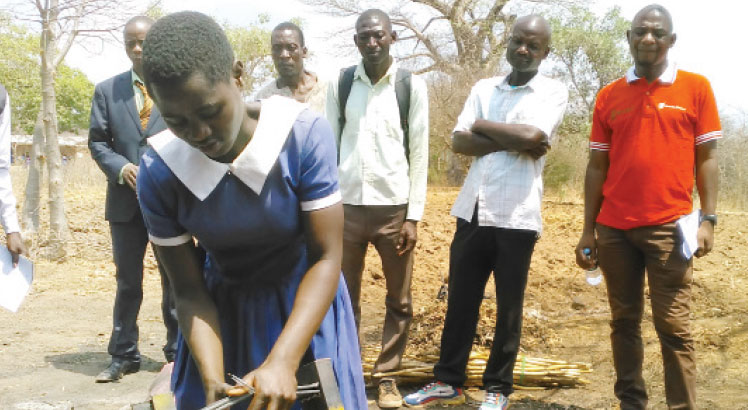Eneless Charles has few fond memories of the period when Covid-19 wreaked havoc on all spheres of life and the government imposed measures meant to contain its spread.
While she cannot recall any Covid-19 case in her area, communities around Majiga Trading Centre in the area of Traditional Authority Khongoni in Lilongwe lived under the threat of infection.
They went to extraordinary heights to ensure they kept the virus at bay.
“We were obliged to wear masks every time we visited Chilobwe Health Centre,” she says.
While wearing masks was almost universal, she did not like that there was no running water at the health centre.
Health workers were also forced to draw water from a borehole hundreds of metres away from the health centre. It was a tiresome task for them.
The solar panels and water tank at Chilobwe Health Centre
Eneless, who lives in the village where the health centre is located, has witnessed the challenges it has experienced and testifies how vital water is to such facilities, especially for someone like her who has a one-month old baby.
“Previously, if a child was sick and needed water to take medicine with, people would go to the staff houses to ask for water. It was inconveniencing,” she says.
Eneless laments that hospital staff could not clean the floor properly due to lack of water which increased the risks of infections spreading.
“Hospital staff were never able to draw enough water from the borehole,” she explains.
The tide has now changed.
Thanks to support from USAid, Unicef Malawi constructed a solar-powered water pumping facility that connects water not only to the health centre, but also to the adjacent Majiga Primary School and surrounding communities around Majiga Trading Centre.
The facility was constructed under the ‘Emergency Water Supply and Hygiene Improvement in Covid-19 affected Areas in Malawi’ project.
Unicef Malawi has been implementing in Blantyre, Chitipa, Karonga and Lilongwe.
Among other objectives, the initiative sought to rehabilitate and upgrade existing water schemes in institutions and expand the distribution networks to improve service level as well as provide WASH supplies for Covid-19 prevention and control.
Jackson Ndayizeye, water, sanitation and hygiene specialist at UNICEF Malawi, explains that the 12-month project targeted the four districts with the primary goal of contributing to the control of Covid-19 in Malawi through improved water supply services and hygiene practices.
“The project focused on 18 health care facilities across the listed districts and nearby schools and communities. Chilobwe was considered for being in Lilongwe, which is one of the districts with high Covid-19 caseload,” Ndayizeye says.
Lackson Njolo, the medical assistant in charge of Chilobwe Health Centre, is grateful for the intervention.
“Having water at any health facility helps a lot. For you to prevent infection, you need safe water. If a patient has vomited or a child has soiled itself, you need to have water handy to clean after them. If we prescribe medicine and require the patient to take it there, having clean water is a must. So water helps us in a lot of ways,” Njolo says.
The newly upgraded water supply system for Chilobwe health centre is equipped with a chlorination unit, and the facility also has adequate supplies of chlorine tablets this help to prevent further contamination of water during transportation and handling of water.
The post Safe water for healthcare appeared first on The Nation Online.
 Moni Malawi
Moni Malawi 

